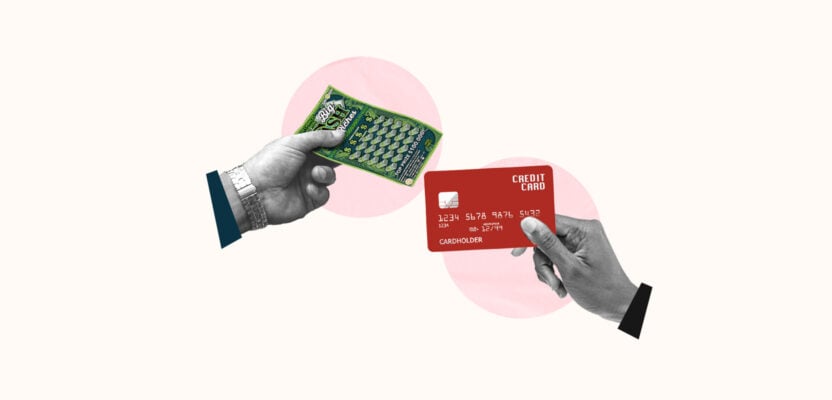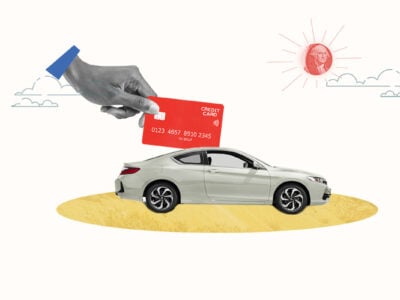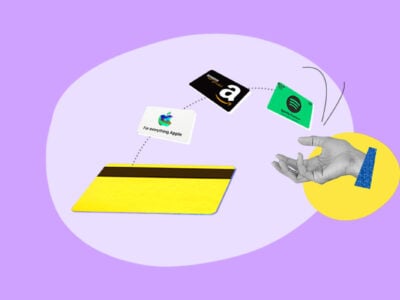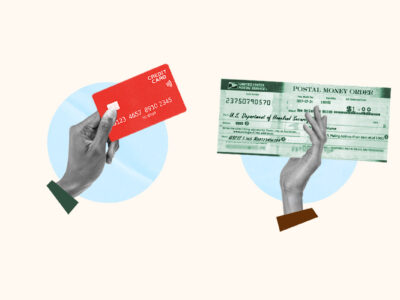It’s sometimes possible to buy a lottery ticket with a credit card—but not everywhere. Many states have laws against doing so, and some stores have their own policies against it, too.
Even if you’re legally allowed to buy a lottery ticket with a credit card, it’s probably a bad idea. Read to learn why you shouldn’t use your credit card to play the lottery.
Table of Contents
What states allow you to buy lottery tickets with a credit card?
At present, there are 21 states that will let you buy a lottery ticket with a credit card.
23 states (and Washington, DC) prohibit retailers, such as grocery stores and gas stations, from accepting credit card payments for lottery tickets.
There are also 6 states that have no lotteries (and don’t participate in multi-state lotteries, such as Powerball and Mega Millions), which means you can’t buy a lottery ticket in them at all.
Look for your state in the table below to see if you can use your credit card to pay for a lottery ticket.
Lottery Ticket Policies by State
| State | Can you buy lottery tickets with a credit card? |
|---|---|
| Alabama | Doesn’t sell lottery tickets |
| Alaska | Doesn’t sell lottery tickets |
| Arizona | Yes |
| Arkansas | No |
| California | Yes |
| Colorado | Yes |
| Connecticut | No |
|
|
|
If you’re in a state that bans credit card payments for lottery tickets, stores won’t let you perform this type of transaction. These laws apply to all types of lottery tickets, including scratch-offs and dailies.
Note that if you’re traveling, you have to follow the laws of the state that you’re buying the ticket in—not your state of residence.
Some stores won’t let you pay for lottery tickets with a credit card
Even in states that allow it, some retail chains or individual stores may refuse to accept credit card payments for lottery tickets.
There are several reasons why a store might have a policy like this. They might want to protect consumers, they might be concerned about credit card fraud, or they simply might not want to pay credit card transaction fees on lottery ticket purchases. (Every time you use a credit card to buy something, the seller has to pay a small fee, generally between 1.5%–3.5% of the transaction’s value.)
If you try to buy a ticket with your credit card and the store turns you down, you can always take your business elsewhere. However, for reasons that we’ll explain in detail, buying a lottery ticket with a credit card is a bad idea, so stores like this are actually doing you a favor. It’s a better idea to just pay in cash instead.
Why you should never buy a lottery ticket with a credit card
When you buy a lottery ticket, most of the time you’ll lose money on it, whatever method you use to pay. (That’s just how the lottery works. If most people won more than they lost, it wouldn’t be profitable.)
Given this, if you like playing the lottery, you don’t want to make it any more expensive for yourself than it has to be—and using a credit card costs more than using cash. It’s a worse deal whether or not you win. It’s also more expensive than making other purchases on your card.
Lottery ticket purchases count as cash advances
When you buy a lottery ticket with your card, your credit card company will usually treat the purchase as a credit card cash advance. This is a special type of transaction that allows you to get cash from your credit card.
Most of the time, getting a cash advance means using your card to get cash from an ATM. However, because lottery tickets can (theoretically) be converted directly into money, they also get treated as cash advances.
Cash advances are more expensive than other transactions because they:
- Often have special fees: When you take out a cash advance, you’ll often have to pay a special fee, e.g., 5% of the transaction or a flat $10, whichever is higher. If your issuer charges a fee like this, your $2 Powerball ticket could easily end up costing $12 instead.
- Have higher interest rates: When you take out a cash advance, the money you spend will be subject to a higher APR (an APR on a credit card is the interest rate you have to pay on your balance). In other words, your lottery ticket purchase will incur additional charges faster than other purchases you make on your card.
- Accrue interest immediately: Most of the time, you have until the end of your credit card billing cycle to pay off your purchases before they start accruing interest. However, cash advances usually start accruing interest right away, so if you don’t pay off your lottery ticket the day that you buy it, you won’t be able to get out of paying extra for it.
Because lottery tickets are treated as cash advances, they can easily cause your credit card balance to snowball. Even if you’re usually a responsible borrower, buying a few relatively cheap tickets can land you in a surprising amount of debt.
The bottom line is that buying a lottery ticket with a line of credit has no real advantages, and has a lot of serious disadvantages. There’s essentially no reason to do it.
Can you buy a lottery ticket with a debit card?
Most states that sell lottery tickets will allow you to pay for one with a debit card, but not all. For instance, South Carolina bans retailers from accepting debit card payments for lottery tickets. They’re only allowed to accept cash. 1
If you’re curious, it’s easiest to look up your state laws and check, since the legislation on this varies widely by state (and can change fairly frequently).
Note that, as with credit cards, some stores might refuse debit card payments for lottery tickets, even if they’re legally allowed to accept them.
Again, these policies are usually meant to protect consumers from identity thieves and criminals. If you want to pay with your debit card, you can always go to a different store.






